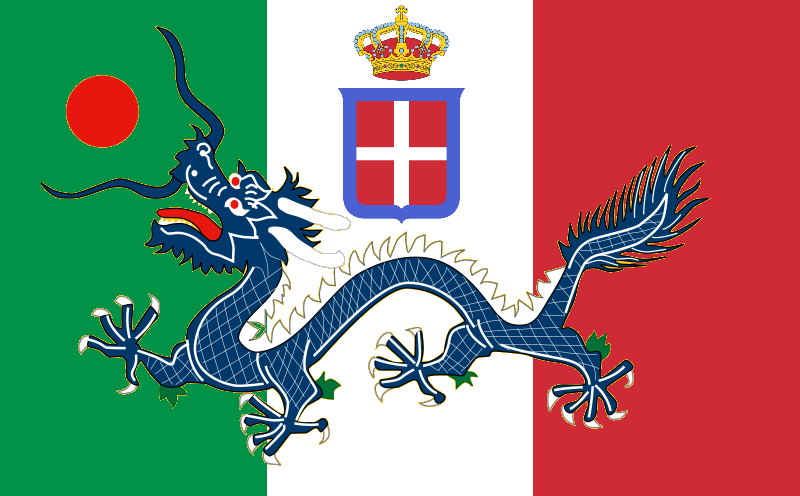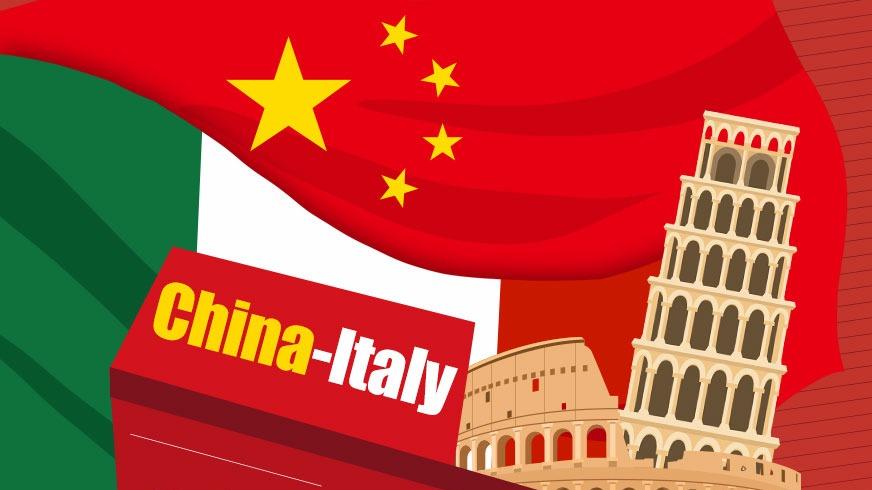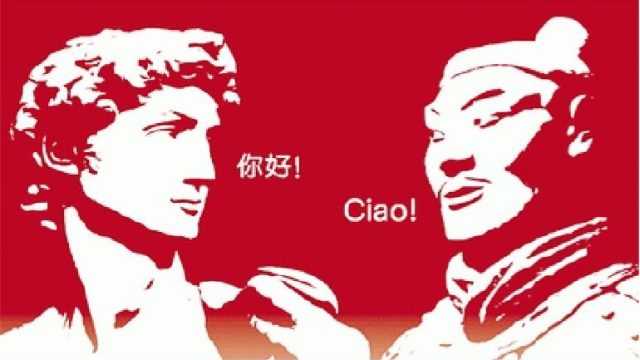One of the stories / questions I heard most of my life is if the Chinappi name might be a sign that it originates from China.
The word “China” appears in “Chinappi”
Chinappi name written with Chinese letters: 基纳皮 (pinyin: jī nà pí) according to Namesedia
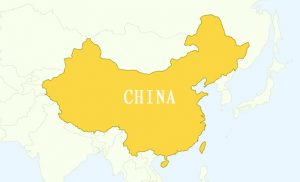
At one point my family had a Coat-of-Arms created and the letter that came with the Coat-of-Arms stated that the origin of the name Chinappi was in part based on a location.
So some people thought that since the word “china” is in Chinappi, then the origin of the name must be from China.
However, Chinappi is an Italian name, and the Italian word for China is “Cina”
Yet, there was another rumor about the Chinappi family tree, and that was the Chinappi does have genetic roots in China.
There are a few of the Chinappi family members that are asked if they are part Asian, because of certain Asian features they exhibit.

When the Chinappi family members (and their descendants) started to do DNA home kit tests, I asked each one that I knew, or made contact with, if any Chinese DNA was listed as part of the genetic mix.
Not one person.
At that point I thought it was just a rumor and decided to move on to other areas of research.
Until the year 2019, when a woman named Teresa, who’s mother was a Chinappi, did a DNA test, and at the very bottom of her DNA Ancestry Composition, was the following entry:
TRACE DNA: Broadly Chinese & Southeast Asian 0.2 %
From the expansive plains of central Asia to the Islands of eastern Indonesia, the people of China and Southeast Asia share genetic similarities dating back to the arrival of humans in the region over 40 000 years ago. Broadly Chinese & Southeast Asian DNA – likely driven in part by the spread of agriculture within the last few thousand years – matches several specific populations and is difficult to assign to just one. – from 23andme explanation
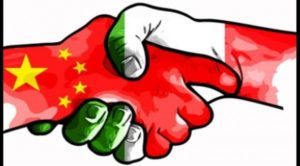
Finally, a DNA test confirm what many suspected.
If you are a Chinappi, or a Chinappi descendant that has any Chinese DNA, please contact us. We want to know you.
ADDENDUM:
I am adding this new information that I did not have when I originally wrote this article.
One of my DNA matches told me that it was folklore that all Italian names starting with CHI meant that the father was Italian and the mother was Chinese. He said that he had heard such stories and rumors all of his life growing up Italian.
Another DNA match suggested that the Italian name of Chinappi when pronounced Key-Napp in certain Italian dialects sounds like the English word “Kidnap”. This led to the possible situation of an English slave trader that may have sold Chinese women that were kidnapped to Italians. This could be an origin to the Chinappi name, although, not the kind of origin that people would want to hear.
It is also possible that a Chinese woman moved to Italy on her own choice. Perhaps she lived in China and an Italian sailor who traveled to China as a merchant, brought back a bride. We assume that the mother was Chinese and the father was Italian because of the Paternal Hapogroup that all Chinappi males have seems to remain consistent. So it may be that the name Chinappi does refer to a Chinese mother.
More research is needed.
——————————————-
I would like to add the follow based on what I found out researching the China Italy connection is that China made contact with Italy.
From Wikipedia:
In Roman Times, the first group of people claiming to be an ambassadorial mission of Romans to China was recorded in 166 AD in the Book of the Later Han. The embassy came to Emperor Huan of Han China from “Andun” (Chinese: 安敦; Emperor Antoninus Pius or Marcus Aurelius Antoninus), “king of Daqin” (Rome).[9][10] In 226 AD China was visited by the Roman Qin Lun (秦論), who wasn’t a diplomat but a merchant. He visited the court of Sun Quan in Nanjing.[11][12] Other Roman envoys followed in the 3rd century. One embassy from Daqin (Rome) is recorded as bringing tributary gifts to the Chinese Jin Empire (266–420 AD).[12][13]
The most notable contact between China and Italy dates back to over 700 years ago, with Italian explorer Marco Polo famously sojourning in the country for seventeen years between 1271 and 1295,[14] a few decades after Giovanni da Pian del Carpine‘s visit to Mongolia.[15] Polo’s visit was followed by the arrival in Beijing of Giovanni da Montecorvino, the first archbishop of Beijing, in 1294.[16] Three hundred years later, Matteo Ricci, an Italian Jesuit priest from Macerata and one of the founding figures of the Jesuit China missions, was the first European to enter the Forbidden City.[17][18]
The Kingdom of Italy established diplomatic relations with China in 1866.[19] Italy received its concession in Tientsin on 7 September 1901. The concession was occupied by the Japanese in 1937, and liberated in October 1945 by the Chinese Army.[20] Italy officially renounced to the concession in 1947.[20] On October 16, 1866 a trade treaty between China an Italy was signed, and eight months later the ambassador Count Vittorio Sallier de la Tour, appointed Italian representative to the courts of Jeddo and Beijing, arrived in East Asia.[19] He and his successors Alessandro Fè d’Ostiani and Raffaele Ulisse Barbolani, however, kept their seat in Japan.[19] Ferdinando de Luca was the first Italian ambassador to be headquartered in China, establishing the embassy in Shanghai, which was moved to Beijing at the end of the 1880s.[19] In 1913, Italy recognized Sun Yat-sen‘s Republic, and thereafter maintained a position of neutrality in the various conflicts with different parties vying for power in China.[19] Italy formally recognized Kuomintang‘s Republic of China, and on November 27, 1928 signed a new trade treaty, which supplanted the 1866 treaty.[19] The negotiations were led by Daniele Varè and the treaty signed in Nanjing, China’s new capital.[19] Chang Kai-shek insisted that all the Occidental powers move their embassies in Nanjing, considering this action as the further, final acknowledgment of his power.[19] Italy, as some other great powers, decided to split its embassy between Nanjing and Shanghai, in two physically detached offices.[19]
Resident diplomatic missions[edit]
- China has an embassy in Rome and consulates-general in Florence and Milan.[49]
- Italy has an embassy in Beijing and consulates-general in Chongqing, Guangzhou, Hong Kong and Shanghai.[50]
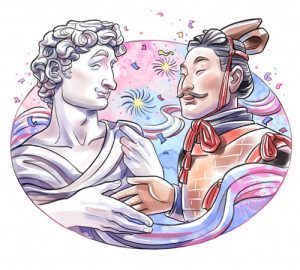
There is also another story I heard that a Chinappi relative had left Italy to immigrate to China, and he was not heard from again. This has me wondering whatever happened to him.
- Did he marry?
- Did he have a family there?
- Do we have Chinese relatives that we do not know, and who do not know us?
IF THIS STORY SOUNDS FAMILIAR TO YOU, AND IF YOU ARE THE DESCENDANTS OF THAT CHINAPPI THAT WENT TO CHINA, PLEASE CONTACT US.
WE WANT TO KNOW YOU.
